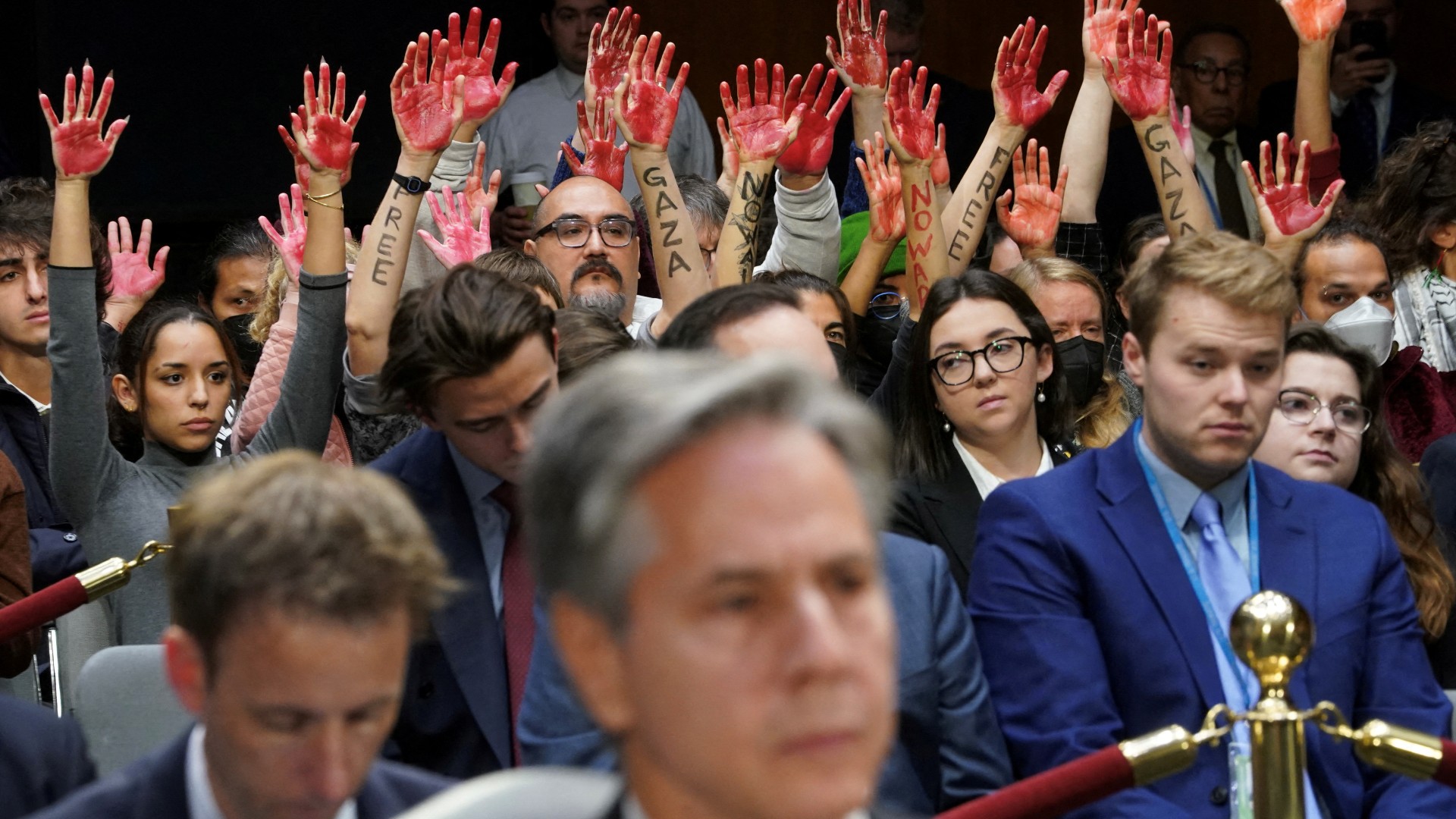Israel-Palestine war: Netanyahu's impossible war between captives and smashing Hamas

Three weeks into the war, the Israeli public has begun to focus on one issue above all others: the fate of the people held captive in Gaza. That means it’s the chief political issue too.
Previously, the relatives of captives - particularly the civilians held by Hamas - gathered in Tel Aviv and elsewhere, attempting to draw attention to their plight in polite semi-demonstrations.
At the end of last week, however, there was a shift: the families began asking for the captives to be released quickly. And though they did not say it openly, they hinted that a ground offensive in the Gaza Strip would put the captives in danger.
Declaring opposition to a ground offensive would simply not be acceptable to an Israeli public bent on revenge for the 7 October Palestinian attack, which killed around 1,400 Israelis.
So, the captives’ families began to suggest instead that the priority should be to return their loved ones, before submitting Gaza to an onslaught on the ground as well as from the sky.
Stay informed with MEE's newsletters
Sign up to get the latest alerts, insights and analysis, starting with Turkey Unpacked
This seems to have placed some pressure on both the army and on Prime Minister Benjamin Netanyahu.
The army responded by saying that beginning the ground offensive is the way to encourage Hamas to soften its conditions for any kind of deal, although no one has really specified what kind of deal Israel itself would like to see.
According to the military, this is why the ground offensive that began last weekend has been somewhat limited in scope, with Israeli troops yet to reach residential areas or Gaza City itself.
Though it is difficult to see exactly how such a ground operation will pile more pressure on Hamas to accept a better deal, the Israeli media nonetheless accepted what the generals told them.
As for Netanyahu, the criticism from the captives’ families has been far more personal, and forced him to meet with some of their representatives on Saturday. The meeting, so I’ve been told, was very, very hard. Harsh words were spoken by the families, personally accusing Netanyahu of being responsible for the whole disaster.
Follow Middle East Eye's live coverage for the latest on the Israel-Palestine war
Afterwards, the families held a small demonstration in Tel Aviv, where they voiced a new demand: all for all.
But again, no one really specified what that means in practice. Nevertheless, it was widely understood as a demand to secure the release of all the captives in Gaza, including soldiers, in return for all Palestinian prisoners in Israeli jails.
We still do not know the exact number of captives held by Hamas and other Palestinian groups in Gaza. Israel keeps revising its total upwards, now saying there are 240 captives, around 30 of which are soldiers.
Swapping these for the 5,200 Palestinians held by Israel - 170 of which are minors - is a far-reaching deal, even in the context of the 2011 Gilad Shalit prisoner exchange where one soldier was freed for 1,027 Palestinians.
When asked about the prospect, Netanyahu did not rule out such a swap, saying it’s on the table, but refused to go into any details.
That in itself is interesting. The idea of releasing all Palestinian prisoners - some of whom have been handed several life sentences over attacks on civilians during the Second Intifada - is a taboo in Israel.
Furthermore, Shaul Mofaz, who was military chief of staff and then defence minister during the Second Intifada, said he supported such a deal. Mofaz was himself responsible for putting many of the most high-profile prisoners behind bars in the first place, and now he was on record saying they should be released.
Contradictory objectives
After the 7 October attack on Israeli communities around the Gaza Strip, Israel had just one military objective: crush Hamas.
Israel wanted to completely rid Gaza of the Palestinian group by any means, including forcing all the coastal enclave’s 2.3 million Palestinians into Egypt. But now, alongside this aim of dismantling Hamas, releasing the captives is considered another key objective of the military operation.
The two goals seem to contradict each other.
It’s not clear how you can really crush Hamas, fighting house to house and street to street, while hoping to bring the captive Israelis back alive. It would be extremely difficult, if not impossible.
So that puts Israel in a complicated situation.
Adding to that is the fact that the main thrust of Israel’s offensive so far has been massive aerial bombardment of the Gaza Strip, which has already killed more than 8,500 Palestinians, including over 3,500 children.
The Israeli army claims it has killed around 50 senior members of Hamas and “hundreds” of fighters. If we are to take those claims at face value, the Hamas death toll stands at around 500 – a fraction of the number of children killed alone.
It’s not clear how you can really crush Hamas, fighting house to house and street to street, while hoping to bring the captive Israelis back alive
The Israeli media isn’t paying much attention to how the world is reacting to the massive loss of life in Gaza, but it should. Public opinion may be shifting. Massive pro-Palestinian demonstrations have been seen in the United States, London and elsewhere in Europe, as well as in Turkey and around the Arab world.
Meanwhile, language from western officials is changing: US National Security Advisor Jake Sullivan, for example, has begun publicly urging Israel to protect civilian lives in Gaza, a notable shift considering how close the Biden administration has been to Israel since 7 October.
Not only is pressure on Israel growing from the West, but within the Arab world too. Attacks continue to pour in from Lebanon, Syria and Yemen.
A massive ground offensive risks destabilising the governments of Egypt and Jordan as well. This is of great concern to the US, which cares far more about the fate of its strategic allies in Cairo and Amman than the people of Gaza.
It also would highly likely lead to the deaths of most captives, which would be a collective trauma for the Israelis.
For all these reasons, a full-blown ground attack does not seem very probable. Continuing the war as it is - bombardment, limited ground operations and perhaps splitting the territory in two and reaching the outskirts of Gaza City - may be the better option.
But how sustainable is that in the long term?
Soon the number of deaths in Gaza will cross the 10,000 threshold and international pressure will grow.
Israelis have been promised a long war, at least a few months. Military reservists are preparing for that eventuality.
Yet it will not be easy to pursue such a conflict in such a developed economy. In the 1973 Middle East war, reservists spent almost half a year in the army, in a far less developed economy.
Already, the Israeli economy is predicted to shrink by 11 percent this quarter following the war. If the situation lasts for months, it will of course become much worse. Key industries like high tech could withdraw investments and personnel.
And while we have not seen the social unrest in Israel that we saw in 2021, when there were riots in mixed Palestinian-Jewish cities alongside a war on Gaza, there are serious internal tensions.
Palestinian citizens of Israel, who make up 20 percent of the population, are being hounded out of their places of employment and universities where they are studying. Sometimes they are targeted for expressing sympathy with people under attack in Gaza; increasingly they are pursued simply because they are Arabs.
On Saturday, a mob of Israelis stormed a dormitory in the central city of Netanya where Palestinian students were staying, shouting “death to the Arabs”.
Meanwhile, Israeli authorities have promised to give 10,000 guns to Israeli settlers in the occupied West Bank and relaxed regulations for civilians to acquire them in Israel, too.
These intercommunal tensions have the potential to be ruinous for the economy. Palestinian citizens of Israel (not to mention workers from the West Bank) perform many essential services. Around a third of Israel’s doctors are Palestinians.
With this in mind, can Israel really prosecute its war for months on end?
No return to the status quo
Everything indicates that Netanyahu’s perfect ending would be to return to 6 October: resuscitate the status quo with Hamas with a ceasefire that leaves the group in power in Gaza but badly beaten and an international pariah.
For three decades the prime minister has bet on preventing a Palestinian state by dividing the West Bank from Gaza and pitting Hamas against Fatah. Until the attack three weeks ago, the strategy served him well.
But Hamas remaining in power in Gaza is totally unacceptable to the Israeli public. And even if Netanyahu wants it, he likely would be unable to deliver it. He is certainly the most hated person in Israel right now, held responsible for the greatest catastrophe the country has endured since 1973.
Israel is stuck between wanting to keep captives alive by refraining from major ground operations, seeking to continue an unsustainable bombing campaign, and trying to remove Hamas from power.
Is there a way out? Perhaps in the spectre of international intervention.
Already the Gaza war is to some extent an international conflict – far more than either intifada or previous conflicts in the territory.
Various heads of state flew to Israel following the outbreak of war. Some are seeing the conflict along the lines of Ukraine and Washington’s cold war with Russia and China. Several of the captives hold foreign passports.
Suddenly there is an urgency in the international community over Israel and Palestine that has been lacking in the two decades following the failure of the Camp David summit. It seems Washington – or at least Joe Biden – is no longer convinced that the Israelis can manage the Israel-Palestine conflict on their own.
Maybe we will see some sort of international force in Gaza (perhaps even an Arab one) as a way out of the fighting that will be acceptable to Israel and its public, as well as the Palestinians and maybe even Hamas.
Another route is far more sinister: prolonged fighting, an attempt to expel all Palestinians from Gaza, tens of thousands dead. That could lead to a regional conflict involving even Jordan and Egypt, perhaps risking the very existence of Israel.
Such worst-case scenarios are very real, and should not be ignored.
But perhaps because of that, there is hope. Hope that the international community will step in before the worst unfolds.
This article is available in French on Middle East Eye French edition.
Middle East Eye delivers independent and unrivalled coverage and analysis of the Middle East, North Africa and beyond. To learn more about republishing this content and the associated fees, please fill out this form. More about MEE can be found here.






